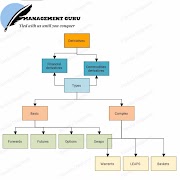HUMAN RESOURCE MANAGEMENT: DEFINITION, EVOLUTION, SCOPE
 |
| HUMAN RESOURCE MANAGEMENT |
INTRODUCTION
For any organisation to run effectively, money is not
enough, it must have resources of men (Human Resource), materials and machinery
also. The resources by themselves cannot fulfil the objectives of an
organisation, they need to be collected, co-ordinated and utilised through
human resources. And, the effective management of human resources came in to
its existence. Hence, Human Resource Management (HRM) has emerged as a major
function in organisations.
DEFINITION OF HUMAN RESOURCE MANAGEMENT
Human Resource Management is the process of recruiting, selecting,
inducting employees, providing orientation, imparting training and development,
appraising the performance of employees, deciding compensation and providing
benefits, motivating employees, maintaining proper relations with employees and
their trade unions, ensuring employees safety, welfare and healthy measures in
compliance with labour laws of the land.
Human Resource Management involves management
functions like planning, organizing, directing and controlling
· It involves
procurement, development, maintenance of human resource
·
It helps to achieve individual, organizational and social objectives
·
Human Resource Management is a multidisciplinary subject. It includes
the study of management, psychology, communication, economics and sociology.
·
It involves team spirit and team work.
·
It is a continuous process.
STAGES OF HRM EVOLUTION:
HRM activities have probably been performed since
ancient times. The pioneering work of Peter Drucker and Douglas McGregor in the
1950s laid its formal foundation.
Modern concept of HRM has developed through the
following stages (Gupta, 1997).
a) The Commodity Concept: Before industrial
revolution, the guild system was the beginning of personnel management. Guild
was a closely-knit group concerned with selecting, training, rewarding and
maintaining workers. Labour began to be considered a commodity to be bought and
sold.
b) The Factor of Production Concept: Employees were
considered a factor of production just like land, materials, machinery.
Taylor’s scientific management stressed proper selection and training of
employees so as to maximise productivity.
c) The Paternalistic Concept: Employees organised
together on the basis of their common interest and formed trade unions to
improve. Also employers began to provide schemes to workers. Employers assured
a fatherly and protective attitude towards their employees.
d) The Humanitarian Concept: It is based on the belief
that employees had certain inalienable rights as human beings and it is the
duty of the employer to protect. Rather social and psychological satisfaction
was equally important. Hawthorne Experiments of Douglas McGregor also generated
considerable interest in human problems of work place. This is also known as
human relations concept.
e) The Behavioural Human Resource Concept: It aimed at
analysing and understanding human behaviour in organisation. Motivation, group
dynamics, organisational climate, organisational conflict etc. became popular
under this concept. Employees began to be considered as valuable assets of an
organisation. Efforts were made to integrate employee with the organisation so
that organisational goals and employees’ aspirations could be achieved
simultaneously. Focus shifted towards management practices like two-way
communication, management by objectives, role of informal groups, quality
circles etc.
f) The Emerging Concept: Now employers are considered
as partners in industry. They are given share in company’s stock membership.
Slowly and steadily, HRM is emerging as a discipline.
SCOPE OF HUMAN RESOURCE MANAGEMENT
According to Dale Yoder, the scope of human resource
management is very wide. It consists of the following functions:
i) Setting general and specific management policy for
organisational relationships, and establishing and maintaining a suitable
organisation for leadership and co-operation.
ii) Collective bargaining, contract negotiation,
contract administration and grievance handling.
iii) Staffing the organisation, finding, getting and
holding prescribed types and number of workers.
iv) Aiding in the self-development of employees at all
levels providing opportunities for personal development and growth as well as
for acquiring requisite skill and experience.
v) Developing and maintaining motivation for workers
by providing incentives.
vi) Reviewing and auditing manpower management in the
organisation.
vii) Industrial relations research—carrying out
studies designed to explain employee behaviour and thereby effecting
improvement in manpower management.
The Indian Institute of Personnel Management has
described the scope of human resource management into the following aspects:
1) The Labour or Personnel Aspect:
It is concerned
with manpower planning, recruitment, selection, placement, induction, transfer,
promotion, demotion, termination, training and development, layoff and
retrenchment, wage and salary administration (remuneration), incentives,
productivity, etc.
2) The Welfare Aspect:
This aspect is concerned with
working conditions and amenities such as canteens, creches, rest rooms, lunch
rooms, housing, transport, education, medical help, health and safety, washing
facilities, recreation and cultural facilities, etc.
3) The Industrial Relations Aspect:
This is concerned
with the company’s relations with the employees. It includes union-management
relations, joint consultation, negotiating, collective bargaining, grievance
handling, disciplinary actions, settlement of industrial disputes, etc.
All the above aspects are concerned with human element
in industry as distinct from the mechanical element.
Great Quotations on human resource
"You must treat your employees with respect and dignity because in
the most automated factory in the world, you need the power of human mind. That
is what brings in innovation. If you want high quality minds to work for you,
then you must protect the respect and dignity. " ---Mr N.R. Narayana
Murthy, Chairman Emeritus, Infosys Ltd .
“Our progress as a nation can be no swifter than our progress in
education. The human mind is our fundamental resource.”
- John F. Kennedy (35th President of
the United States).






3 Comments
Easy to understand
ReplyDeleteThanks management guru, i'll keep on visiting here
ReplyDeleteGood content
ReplyDelete